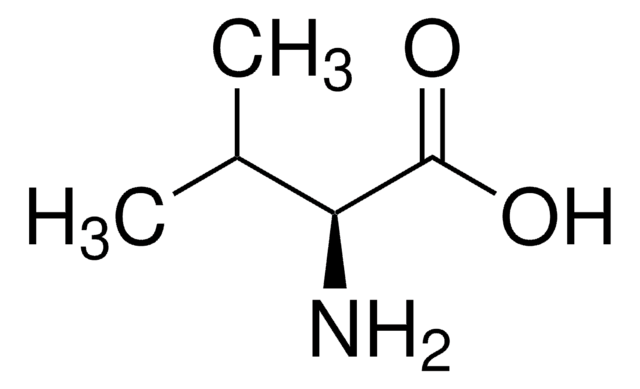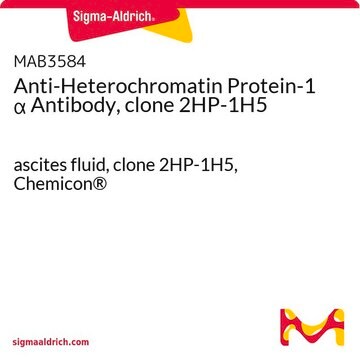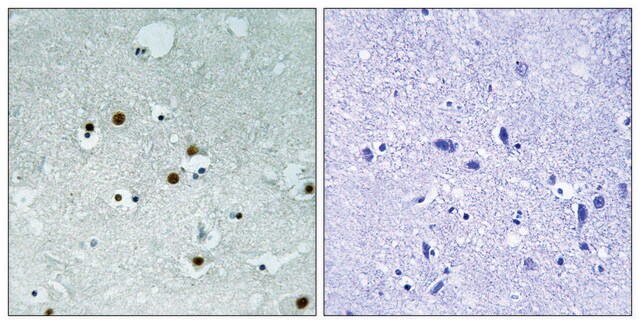05-689
Anti-HP1α Antibody, clone15.19s2
clone 15.19s2, Upstate®, from mouse
別名:
Antigen p25, HP1 alpha, HP1Hs alpha, Heterochromatin protein 1 homolog alpha, chromobox homolog 5 (Drosophila HP1 alpha), chromobox homolog 5 (HP1 alpha homolog, Drosophila), heterochromatin protein 1-alpha
About This Item
おすすめの製品
由来生物
mouse
品質水準
抗体製品の状態
purified immunoglobulin
抗体製品タイプ
primary antibodies
クローン
15.19s2, monoclonal
化学種の反応性
mouse, vertebrates, human
メーカー/製品名
Upstate®
テクニック
ChIP: suitable
immunocytochemistry: suitable
immunohistochemistry: suitable
immunoprecipitation (IP): suitable
western blot: suitable
アイソタイプ
IgG1
NCBIアクセッション番号
UniProtアクセッション番号
輸送温度
wet ice
ターゲットの翻訳後修飾
unmodified
遺伝子情報
human ... CBX5(23468)
詳細
特異性
免疫原
アプリケーション
エピジェネティクス及び核内機能分子
エピジェネティクス
RNA結合タンパク質(RBP)
A previous lot of this antibody has been reported by an independent laboratory to detect HP1a in NIH/3T3 nuclei (Ayyanathan, K., 2003).
Immunoprecipitation/Chromatin Immunoprecipitation:
A previous lot of this antibody has been reported by an independent laboratory to immunoprecipitate HP1α from nuclear extracts and formalin-cross-linked chromatin (Ayyanathan, K., 2003).
品質
Western Blot Analysis:
0.5-2 µg/mL of this lot detected HP1α protein in acid-extracted HeLa cell lysates.
ターゲットの説明
関連事項
物理的形状
保管および安定性
Handling Recommendations:
Upon receipt, and prior to removing the cap, centrifuge the vial and gently mix the solution. Aliquot into microcentrifuge tubes and store at -20°C. Avoid repeated freeze/thaw cycles, which may damage IgG and affect product performance.
アナリシスノート
HeLa, NIH/3T3 and COS cell lysates.
その他情報
法的情報
免責事項
適切な製品が見つかりませんか。
製品選択ツール.をお試しください
保管分類コード
12 - Non Combustible Liquids
WGK
WGK 1
引火点(°F)
Not applicable
引火点(℃)
Not applicable
適用法令
試験研究用途を考慮した関連法令を主に挙げております。化学物質以外については、一部の情報のみ提供しています。 製品を安全かつ合法的に使用することは、使用者の義務です。最新情報により修正される場合があります。WEBの反映には時間を要することがあるため、適宜SDSをご参照ください。
Jan Code
05-689:
試験成績書(COA)
製品のロット番号・バッチ番号を入力して、試験成績書(COA) を検索できます。ロット番号・バッチ番号は、製品ラベルに「Lot」または「Batch」に続いて記載されています。
ライフサイエンス、有機合成、材料科学、クロマトグラフィー、分析など、あらゆる分野の研究に経験のあるメンバーがおります。.
製品に関するお問い合わせはこちら(テクニカルサービス)








